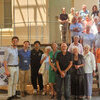Vision 2030: initiating change
16 September 2020 | Story Niémah Davids. Photo Robyn Walker. Read time 9 min.
Looking ahead, the new University of Cape Town (UCT) will embrace inclusivity, promote non-racialism and erase all traces of the past’s injustices, assured Vice-Chancellor Professor Mamokgethi Phakeng.
Professor Phakeng was speaking at UCT’s final virtual Vision 2030 staff engagement session, which took place on Tuesday, 15 September. She was joined by other members of the executive team.
The university is in the middle of developing its Vision 2030 strategy, which is centred around three key pillars: excellence, transformation and sustainability. Phakeng stressed that excellence can’t exist in isolation – it needs transformation to help it cultivate sustainability.
“Transformation is what’s going to enable us to see excellence emerging. We’ve got to hold these two pillars together. That’s the only way we’ll be able to ensure sustainable success for the university,” she said.
‘UCT can’t miss the moment’
According to Phakeng, higher education institutions in South Africa continue to operate on unstable, unpredictable and competitive territory. She said that the digital revolution; demands for life-long learning; global financial crises; and ongoing calls to introduce new forms of knowledge, skills and competencies at university level have been some of the major drivers for reinvention.
“Reinvention is necessary for [UCT] to remain competitive and sustainable.”
“Reinvention is necessary for [UCT] to remain competitive and sustainable. We want to be proactive, initiate the change, decide who we want to be as a university and how we are going to distinguish ourselves in the midst of many other institutions.”
UCT’s proposed vision is to become an institution that unleashes human potential for a fair and just society. The university aims to make a distinct contribution in the following areas:
- provide holistic, innovative and future-orientated education
- conduct research that addresses Afrika’s* challenges and contributes to global knowledge
- offer thought leadership
- inculcate an organisational ethos that supports new and diverse ways of thinking, doing and being.
Alongside transformation, Phakeng said that social responsiveness is regarded as an additional “cross-cutting” element of UCT’s new ethos and must be embedded in the university’s strategic choices at all levels.
Transformation and social responsiveness beyond 2020
Deputy Vice-Chancellor for Transformation Professor Loretta Feris said that developing the university’s transformation vision required collective buy-in from staff and students. These participants, she said, provided input on what transformation and social responsiveness should look like beyond 2020. During interactive and robust conversations, the group listed and worked through the specific principles that UCT should include in its Vision 2030 document to help move the university forward.
“The massive transformative purpose that we ended up with as part of this think space was this: Redress inequality and build social justice through targeted strategies to return dignity and amplify voice,” Professor Feris said.
Unpacking the four transformation principles, Feris said that the first step to redressing inequality is acknowledging that it exists, both in society and on campus. Similarly, ensuring that there’s a return to dignity means acknowledging the many ways racism, sexual harassment and gender-based violence manifest. Lastly, amplifying voice means allowing members of the campus community to contribute to debates and conversations and have the “agency to drive the solution”.
“All of this speaks to the need to ensure social justice at the university and beyond the university.”
“All of this speaks to the need to ensure social justice at the university and beyond the university.”
Feris said that UCT has already started embedding this ‘thinking and doing’ in its work across campus. Together with her team at the Office for Inclusivity & Change (OIC), several anti-racism approaches are in the making. These approaches, which will be publicised at a later stage, will speak to some of the critical debates needed at UCT in order to address racism head on.
Holistic, informative, future-orientated education
Deputy Vice-Chancellor for Teaching and Learning Associate Professor Lis Lange said that Vision 2030 prompts UCT to offer and deliver holistic, informative and future-oriented education. This doesn’t mean that the university exists solely as an education provider for future professionals. It means that the university also exists to shape, critique and transform students’ thinking.
To achieve this goal, Associate Professor Lange said that UCT needs the following in place:
- professionally trained academic staff – teaching and learning cannot be a common-sense activity that people do just because they know the discipline
- new, transformative and inclusive pedagogies that support new classroom relationships between lecturers and students and between students themselves
- decolonised knowledge and ideas on how to navigate this space, while a range of other learning disciplines develop speedily too
- appropriate resources and infrastructure – spaces that respond to a democratic and collaborative way of learning
- dynamic partnerships with stakeholders to support and offer students insights into the workplace and what it would be like to put the knowledge they gain at university into practice
- academic administrative and support services that serve students.
“With all this in mind, the transformative purpose in the area of teaching and learning is to unleash the students’ potential through education and for them to be resilient agents of change for themselves and society,” Lange said.
Research that solves Afrika’s problems
For Deputy Vice-Chancellor for Research and Internationalisation Professor Sue Harrison it is necessary to produce research that will help solve some of the continent’s most pressing challenges and contribute to global knowledge. To produce world-class research, UCT’s research areas will need to be developed and will need a strong interdisciplinary basis.
“[We need] interdisciplinary action and expertise.”
“[We need] interdisciplinary action and expertise, which [will] allow us to further expand [on] the new knowledge that we create. While we focus on Afrika, we envisage that we will be able to position this knowledge that we create to global benefit,” Professor Harrison said.
Creating a research ecosystem is the first step to achieving this goal. The ecosystem, Harrison said, should be founded on strong principles. It requires partnerships across the university, as well as on the outside, from government and civil society – both nationally and internationally.
Looking ahead, there’s also a need to bring on board a group of diverse and excellent researchers who are capable of working in interdisciplinary teams across a range of disciplines.
“These researchers will allow us to build teams across disciplines to create innovative, new knowledge. This is something that we’ve already demonstrated that we’re quite good at, and we must keep on doing it with much more rigor.”
More than that, the university needs agile, innovative and efficient research management systems that allow researchers to work well and monitor the complex environments in which they operate. Introducing integrated research facilities that allow “maximum benefit” and sharing facilities with collaborators across the globe is also on the cards.
“Brining all this together, we get to our massive transformative purpose: unleashing knowledge in and from Afrika to redefine and cocreate a sustainable future.”
Improving systems
Staff and students remain UCT’s “largest and biggest asset”.
Reaffirming and re-evaluating staff members’ positions at the university will inform Vision 2030. To tick this box, UCT’s chief operating officer, Dr Reno Morar, said that two projects are currently in progress:
- a review of UCT’s staff development strategy
- a review of UCT’s performance strategy and performance management system.
“Part of enabling this new vision is to look at what we are doing and then improving it.”
Further, reviewing UCT’s operating systems has also begun. In research finance, Dr Morar said, introducing more efficient and effective ways of working is a priority. The student management and administration system is also being looked at, and new service delivery models are being examined to better serve the campus community.
“Part of enabling this new vision is to look at what we are doing and then improving it and making it better to enable the vision to be realised.”
*UCT’s choice to spell Afrika in this way is an invitation to reclaim Afrika’s agency and use it to validate the global character of the local in the 21st century.
 This work is licensed under a Creative Commons Attribution-NoDerivatives 4.0 International License.
This work is licensed under a Creative Commons Attribution-NoDerivatives 4.0 International License.
Please view the republishing articles page for more information.




























































































































































































































































































































































































































































